Can eating too much wheat be a
factor in causing visceral abdominal fat, acne, joint problems and
arthritis, IBS and acid reflux, cravings, addictive behaviors, increased
overall calorie consumption, diabetes, heart disease, accelerated
aging, and autoimmune diseases? Let's have a look...
by Mike Geary, Certified Personal Trainer, Certified Nutrition Specialist
Author of the best-sellers: The Truth About Six Pack Abs
&
The Top 101 Foods that FIGHT Aging

One thing you may know about me is that I believe in continuing to
educate myself on nutrition and fitness, and passing that information
onto you, my reader. I feel that regardless of how much we've already
studied over the years, there's always new things you can learn that can
help improve your health for a higher quality of life.
That's why I try to always read at least 2 new books every month on
nutrition, to keep learning new things all the time. Despite how much
we already know, there's always new things to learn.
I've found this to be especially true of a new book I'm reading right now called
Wheat Belly, by Dr. William Davis... there are lots of gems inside this book that I will be sharing with you over the next couple weeks.
There's a lot to discuss about this topic, so I wanted to start with just a few of the most important points in the book...
This is a topic that you should pay close attention to, as
wheat is one of the biggest sources of calories in the average person's diet
(along with corn and soy, which are equally bad). The average American
eats a whopping 133 pounds of wheat per year, which includes babies in
that average, meaning that the average adult eats well over 150 lbs of
wheat per year.
Most people eat wheat at every meal...bagels, muffins, or cereal at
breakfast... a sandwich at lunch... crackers, pretzels, and other
wheat-based snacks all day long... bread on the side at dinner... and
maybe even some cake or brownies for dessert. Yes, a day in the life of
the average consumer makes most of us look like "wheat-a-holics".
First, as you know, I've talked a lot in past newsletters about why I
believe that grains in general, and also wheat in particular, should not
be a large part of your diet as government guidelines recommend.
We've talked about the negatives of anti-nutrients -- compounds in many
grains that prevent some nutrients/minerals from being absorbed in your
body, leading to possible
deficiencies in some nutrients if you eat grains at most meals.
We've also talked about the possible negative effects of gluten on not
just celiacs, but a large % of the population that can experience
chronic gut inflammation from too much gluten, too often. And we've
also talked about the negative aspects of many grains on your blood
sugar cycle, the caloric density of grains, and the weight control
challenges that grain-based foods can give you if you're not a
super-active athlete.
From all of my research, I see grains on a scale like this:
* oatmeal and rice -- Not the most ideal food, but not so terrible (only if you're VERY active)
* wheat and corn -- Not much healthy about these at all (regardless of your activity level)
...with many other grains somewhere in the middle. It's all about the
different anti-nutrients that each contains, the gluten factor, and
whether they are genetically modified.
As a generalization, there are many more negative health aspects to
wheat and corn than there are in rice and oats. We'll discuss all of
this in more detail in future newsletters.
But let's start today and focus on wheat...
Why in the world does Dr. William Davis conclude in his book that "whole
wheat" is terrible for your health? Well, let's start with a few of
the topics Dr. Davis talks about in his book,
Wheat Belly:
1. The wheat we eat today is very different biochemically than the wheat even just 50 years ago
First and foremost, Dr. Davis goes through the history of wheat in
the human diet, which goes back to only about 10,000 years ago. He
talks about how the type of wheat that was eaten 1000's of years ago is
biochemically not the same wheat we are eating today. And in fact, even
the wheat our grandparents ate just 50 years ago is a far cry
biochemically from the wheat that is used today. This is because wheat
has been hybridized heavily over the years to increase crop yield and to
increase certain baking characteristics or taste.
Dr. Davis states:
"Small changes in wheat protein structure can
spell the difference between a devastating immune response to wheat
protein versus no immune response at all."
The take-home message... today's wheat is quite different than even just
50 years ago, as today's wheat has different levels of anti-nutrients
and gluten with overall biochemical differences.
Essentially, big agra has hybridized wheat heavily over the last 5
decades to improve things such as crop yield and baking characteristics,
but never once thought about the impacts on human health of changing
the biochemical structure of wheat. Although the biochemical
differences may seem small, it can have a major impact on how the human
digestive system processes the food.
Dr. Davis points this out with this passage... "
Wheat gluten
proteins, in particular, undergo considerable structural change with
hybridization. In one hybridization experiment, 14 new gluten proteins
were identified in the offspring that were not present in either parent
wheat plant." This means that modern wheat contains new "foreign"
gluten proteins that the human digestive system has not adapted to
properly digesting.
Because of all of this, Celiac disease, an autoimmune disease with complete gluten intolerance,
has increased fourfold in the last 50 years. Dr Davis also believes that gluten sensitivity has increased in similar levels in the last 50 years.
The message is that even if you haven't been diagnosed with Celiac or
Gluten Sensitivity, it doesn't mean that constant daily gluten intake
isn't causing chronic gut inflammation and some sort of possible long
term digestive system damage, along with other possible autoimmune
diseases. And remember that chronic gut inflammation can also possibly
lead to cancer later in life.
2. Wheat has addictive properties similar to opiate drugs
Dr Davis makes a very convincing argument that wheat is
addictive. Wheat contains compounds termed "exorphins" that have an
effect in your brain similar to opiate drugs. This explains why people
have such a hard time giving up their beloved breads, cereals, pasta,
and muffins because these foods are mildly addictive.
I know personally from past experience that if I have have a pasta
dinner, I'll go back for seconds and thirds as I just can't seem to stop
eating the stuff. And then hours after dinner, I'll get cravings for
more carb-based foods or sweets. But if I pass on the pasta and just
have meat, veggies, and salad, I find myself totally satisfied after
dinner with no cravings later at night.
3. Wheat makes you consume more calories
Possibly due to the additive nature of wheat products, and the
subsequent cravings for more carb based foods, Dr Davis cites studies in
his book showing that wheat eaters eat more calories overall than
people on a gluten-free diet. One study he cited showed 14% higher
caloric intake in wheat eaters than those on a gluten-free food plan.
Dr Davis also notes: "
It might be due to the lack of exorphins,
reduction of the insulin-glucose cycle that triggers hunger, or some
other factor, but elimination of wheat reduces daily calorie intake by
350 to 400 calories -- with no further restrictions on calories, fats,
carbohydrates, or portion sizes. No smaller plates, prolonged chewing,
or frequent small meals. Just banishing wheat from your table."
The message... it's a LOT easier to control your total calorie
intake by avoiding wheat based foods like cereals, breads, muffins, and
pasta (with the exception of 1 cheat day per week if you can't fathom
giving up wheat altogether).
4. Wheat raises your blood sugar even more than table sugar
The type of complex carbohydrate that comprises wheat is called
amylopectin A,
which is a type of carb that is unique in that it is digested so fast
that it highly affects blood sugar more than most other carb sources.
Dr Davis cites studies in his book that prove that wheat bread can raise
blood sugar HIGHER than table sugar, due to it's amylopectin A content.
Dr. Davis even states:
"Aside from some extra fiber, eating two
slices of whole wheat bread is really little different, and often worse,
than drinking a can of sugar-sweetened soda or eating a sugary candy
bar."
Dr. Davis discusses the fact that the amylopectin A which is uniquely
found in wheat and not other sources of carbs raises blood sugar to a
much higher degree than most other carbohydrates sources, regardless of
whether they are simple or "complex" carbs. He continues, "
In fact,
the degree of processing, from a blood sugar standpoint, makes little
difference: Wheat is wheat, with various forms of processing or lack of
processing, simple or complex, high fiber or low fiber, all generating
similarly high blood sugars."
5. Excessive wheat consumption leads to visceral fat in the abdomen
There are many causes of visceral fat in the abdomen and Dr Davis
isn't trying to fully lay the blame on wheat, but he makes a case that
shows that wheat is a heavy contributor to visceral fat. Through a
combination of wheat's trigger on the blood sugar and insulin process in
your body, the ability of wheat to automatically increase calorie
consumption, as well as the digestive system inflammation
characteristics of some of wheat's contituents, including gluten, this
all leads to a greater chance of developing visceral fat in your
abdomen.
And as you know from my article above, visceral fat is particularly
dangerous as once it accumulates in your gut and around your organs, it
continuously releases inflammatory molecules into your system. We've
talked before about how high fructose corn syrup and other junk foods
can increase visceral fat, but Dr. Davis makes a strong case for how
wheat can also contribute to visceral fat accumulation.
The message... Eliminate the wheat (aside from one cheat day per week
if you absolutely must), and you'll lose the belly much faster.
6. Irritable Bowel Syndrome (IBS) and Acid Reflux may be linked to wheat consumption
Dr. Davis makes a good argument in his book showing links between gluten consumption and IBS and acid reflux. He states, "
Eliminate
wheat, acid reflux improves, symptoms of IBS improve. Unfortunately,
this effect has not been quantified, though investigators have
speculated on how large a role gluten plays in non-celiac sufferers of
IBS and acid reflux." Dr. Davis also states that hundreds of his own patients have seen
complete or partial relief from IBS and acid reflux with gluten removal from their diet.
If you have IBS or acid reflux, you should at least consider removing
wheat from your diet for 2-3 weeks and see if the symptoms go away. It
certainly can't hurt anything to eliminate wheat for a couple weeks
(after all, there's nothing "essential" about eating wheat), and if
anything, you'll lose some body fat as well in the process.
7. Wheat consumption leads to accelerated aging
Eating too many wheat products such as bread, bagels, muffins,
cereal, crackers, etc increases compounds in your body called Advanced
Glycation End Products (AGEs). I talked in a previous article here about how sugar can make you age faster and how to prevent this.
But it's not just sugar and corn syrup that cause this problem... as
we've already mentioned in this article, the main starch in wheat
products is a very unique and fast digesting starch called Amylopectin
A, which raises blood sugar even more significantly than table
sugar. Due to the significant blood sugar effect of wheat products
(yes, even "whole wheat"), this means it increases those nasty AGEs in
your body which contribute to premature aging and wrinkles.
If you're concerned about aging and want to stay looking youthful, make sure to read this article:
>>
5 tricks for looking 10 years YOUNGER
8. Too much wheat in the diet can cause ACNE problems
According to Dr. Davis, pimples (aka, acne) affects up to 95% of
16-18 year olds in western cultures, and even affects 50% of adults over
age 25 with intermittent bouts.
But Dr. Davis provides evidence that acne is NOT caused by genetics,
but rather almost entirely by diet. He discusses how cultures that rely
on a basic hunter-gatherer diet, or some other form of diet that does
not include wheat or sugar, have been curiously acne free (until western
diet influences came in of course).
Dr. Davis talks about how acne is nearly universal in young
Americans, but does not occur at all in other cultures. He states, "
Some
cultures display no acne whatsoever. Cultures as wide ranging as the
Kitavan Islanders of Papua New Guinea, the Ache hunter-gatherers of
Paraguay, natives of the Purus Valley in Brazil, African Bantus and
Zulus, Japan's Okinawans, and Canadian Inuit are curiously spared the
nuisance and embarrassment of acne."
Dr. Davis then cites research that shows that once Western influence
introduced wheat, sugar, and other processed foods into the diets of the
Okinawans, the Inuits, and the Zulus, acne soon followed.
9. Wheat consumption contributes to heart disease risk
Another interesting chapter in the book
Wheat Belly is where Dr. Davis makes a strong case that frequent wheat consumption increases your heart disease risk.
As you may have heard before, the LDL particles in your blood stream
can be characterized as large puffy LDL types (which do not contribute
to heart disease) or small dense LDL particles (which do contribute to
plaque buildup and heart disease). Dr. Davis states, "
Foods that
increase blood glucose the most therefore translate into both greater
quantities of small LDL and increased glycation of small LDL. So heart
disease and stroke are not just about high cholesterol. They are caused
by oxidation, glycation, inflammation, small LDL particles ... yes, the
processes triggered by carbohydrates, especially those made of wheat."
10. Eating wheat adds a large acid burden that your body must deal with
Your body is hard wired to keep a very precise pH level in your body
of approximately 7.4. What foods you consume either contribute
acidifying compounds or alkaline compounds. A natural hunter-gatherer
diet is well balanced with the acid compounds of meats being easily
counteracted by alkaline producing fruits, nuts, and veggies. But when
you add the acid burden of grains to the equation, the acid-alkaline
balance shifts towards acid.
The more acidifying compounds that you eat or drink (soda, grains,
sugar are examples), the more your body needs to pull calcium compounds
out of your bone to regulate pH in your body. This can cause weak bones
and osteoporosis as you age.
According to Dr. Davis, grains such as wheat account for 38% of the average American's acid load. Dr Davis states, "
Around
10,000 years ago, the formerly alkaline human diet pH balance shifted
to the acid side with the introduction of grains, especially the most
dominant of grains, wheat. The modern human diet of plentiful "healthy
whole grains" but lacking in vegetables and fruit is highly
acid-charged, inducing a condition called acidosis. Over years, acidosis
takes it's toll on your bones."
Dr. Davis also cites a University of Toronto study that showed
increased gluten intake increased urinary calcium loss by 63%, along
with increased markers for bone weakening. So even if you're not Celiac
or gluten sensitive officially, this is yet another reason to consider
reducing or eliminating gluten and wheat from your diet.
11. A link between wheat consumption and joint degeneration, including arthritis
Dr. Davis also includes a chapter about how eating too much wheat
over the years is linked to joint problems and pain, including
arthritis. Dr. Davis states: "
The more wheat products you consume,
the higher and more frequently blood glucose increases, the more
glycation occurs. Glycation represents an irreversible modification of
proteins in the bloodstream and in body tissues, including joints such
as the knees, hips, and hands. The cartilage in joints is uniquely
susceptible to glycation, since cartilage cells are extremely long-lived
and are incapable of reproducing."
Dr. Davis continues... "
The damage of glycation is cumulative,
making cartilage brittle and unyielding, eventually crumbling. Joint
inflammation, pain, and destruction results, the hallmarks of arthritis."
The message... if you want healthy joints for life (I know I still
want to be enjoying skiing and mountain biking, two of my favorite
things in life, for decades to come) then Dr. Davis makes a strong case
that eliminating or greatly reducing wheat in your diet can be an
important step to help protect your joints as you get older. And if you
already have arthritis, it's a worthy test to eliminate wheat from your
diet for a full 3-4 weeks and see if you notice some relief. After
all, what could it hurt... if anything, a side effect of eliminating
wheat is that you'll drop some body fat.
Summary and Choices -- Do we eliminate or reduce wheat in our diets?
As you can see in the 11 major points we've discussed above, there
are a lot of negative consequences to your health of eating too much
wheat. And I'd be hard pressed to find any benefits whatsoever of
eating wheat.
Fiber content may be the only possible benefit of wheat, however you
can easily get more than enough fiber in your daily diet from fruits,
nuts, and veggies instead, without the harmful health effects of wheat.
So you have a choice at this point... if you're the type of person
who will do anything to improve your health and have a better body, both
in looks and internal health, eliminating wheat is your best bet.
But if you're like most people, the thought of never eating wheat
cereals, breads, muffins, pasta, and crackers is just too hard to bear.
If you're this type of person, you can still reap the benefits of
greatly reducing wheat in your diet, but minimize your consumption to
one weekly cheat day. It helps to only have this cheat day which might
include your favorite wheat products at restaurants, so you keep all
wheat foods out of your house and not be tempted by them during the
week.
Remember that one very pleasant side effect of eliminating wheat at
least 6 days a week is that most people reduce their body fat
significantly after making this choice and sticking to it.
And as we've talked about in this article, reducing or eliminating
wheat can also prevent acne, reduce heart disease risk, slow down the
aging process, reduce symptoms of IBS or acid reflux, help stabilize
your blood sugar (assuming you're not still eating loads of sugar and
wheat-free junk food), reduce diabetes risk, reduce visceral fat in your
abdomen, and more!
Considering the possible benefits to our appearance and health, I'll
choose to continue to reduce wheat in my diet! For me, I've chosen to
not completely eliminate wheat, but rather to never have it in my house,
and only indulge in wheat products on once-weekly cheat days or while
on vacation.
Do you want a healthier and better looking body? The choice is
yours! Although we still need to consider major health killers such as
sugar, HFCS, processed soy foods, processed corn foods, trans fats, and other junk foods, the case has been made that
wheat is one of the biggest culprits in our health problems.
Please share today's article about the health effects of wheat with
all of your friends and family to help protect their health too... easy
sharing options are below:

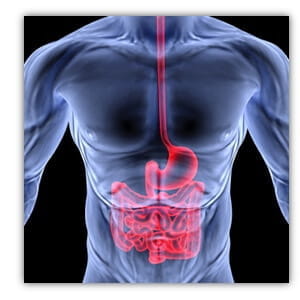 The topic of gluten is on fire in the media lately... But most people are confused as to whether there's any real health risks with gluten for the average person that doesn't have Celiac disease.
The topic of gluten is on fire in the media lately... But most people are confused as to whether there's any real health risks with gluten for the average person that doesn't have Celiac disease.





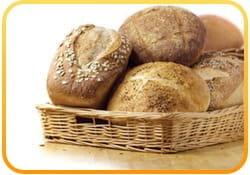 Due
to biochemical reactions in your body that occur with every type of
food you eat on a daily basis, some foods age you FASTER than your real
age, while other foods help to FIGHT aging.
Due
to biochemical reactions in your body that occur with every type of
food you eat on a daily basis, some foods age you FASTER than your real
age, while other foods help to FIGHT aging.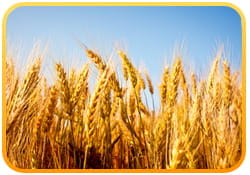
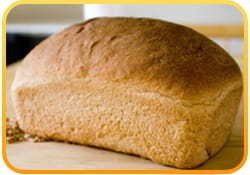
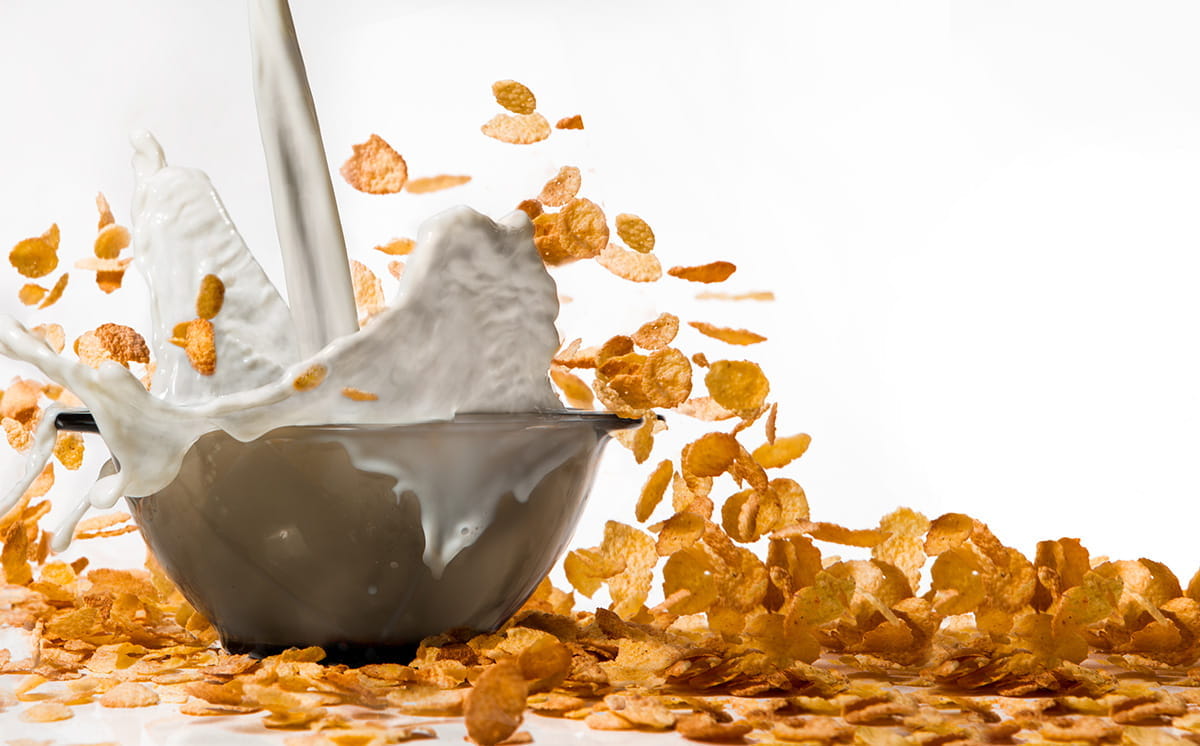 If
you care at all about your body and health, I'm sure you already know
to avoid the obvious sugary cereals like the flakes with sugar frosting,
the fruity sugar cereals with artificial colors, the frosted wheat
biscuits, or the marshmallow cereals that so many parents are poisoning
their kids with these days.
If
you care at all about your body and health, I'm sure you already know
to avoid the obvious sugary cereals like the flakes with sugar frosting,
the fruity sugar cereals with artificial colors, the frosted wheat
biscuits, or the marshmallow cereals that so many parents are poisoning
their kids with these days.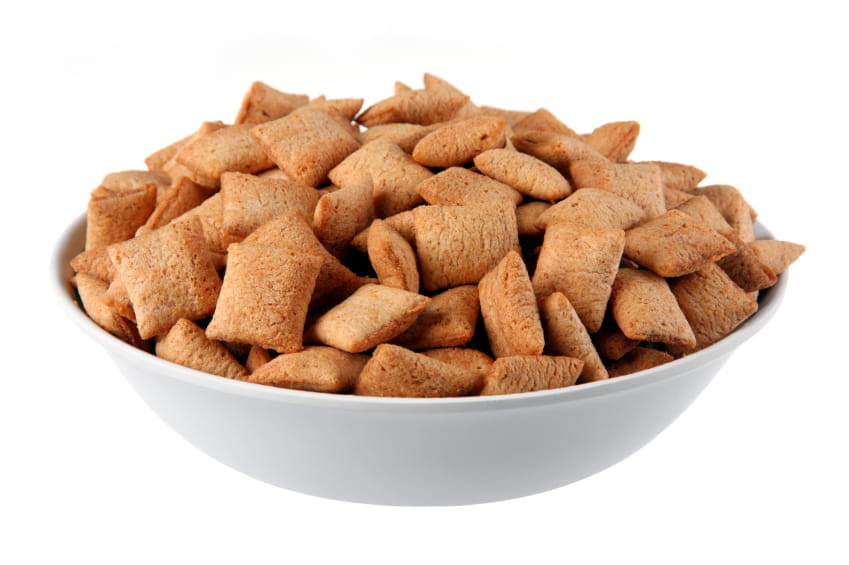 Those
massive spikes in your blood sugar essentially damage your cells in
your body through a process called glycation, which accelerates the rate
of aging in your joints, skin, organs, and even your brain. Ouch...
That tiger on the cereal commercials is never going to warn you about
that!
Those
massive spikes in your blood sugar essentially damage your cells in
your body through a process called glycation, which accelerates the rate
of aging in your joints, skin, organs, and even your brain. Ouch...
That tiger on the cereal commercials is never going to warn you about
that!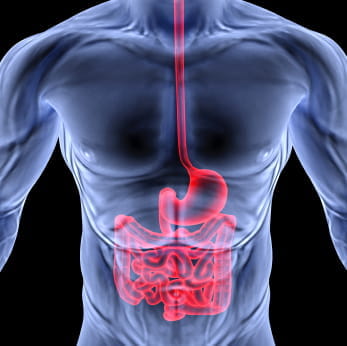 More bad news about cereal...
More bad news about cereal... Instead
of the typical cereal in the morning (that's slowly killing you and
making you fatter), try a bowl of plain greek full-fat organic yogurt
(which is loaded with healthy gut probiotics, healthy fats, AND protein)
and add in a handful of fresh, organic berries (or frozen wild
blueberries), a handful of nuts such as either almonds or pecans (more
healthy fats), and a little stevia or vanilla protein for a little added
sweetness if you need it.
Instead
of the typical cereal in the morning (that's slowly killing you and
making you fatter), try a bowl of plain greek full-fat organic yogurt
(which is loaded with healthy gut probiotics, healthy fats, AND protein)
and add in a handful of fresh, organic berries (or frozen wild
blueberries), a handful of nuts such as either almonds or pecans (more
healthy fats), and a little stevia or vanilla protein for a little added
sweetness if you need it.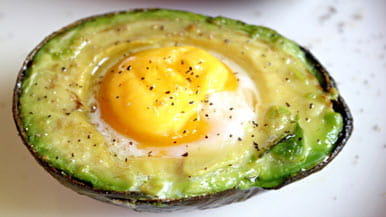 Another
option is simply any combination of eggs, veggies, avocado, and even
organic breakfast meat if you want. One of my favorite quick breakfasts
is to cook up a couple eggs over easy real quick and slice a half of an
avocado on a plate.
Another
option is simply any combination of eggs, veggies, avocado, and even
organic breakfast meat if you want. One of my favorite quick breakfasts
is to cook up a couple eggs over easy real quick and slice a half of an
avocado on a plate.



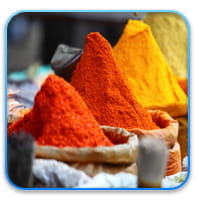
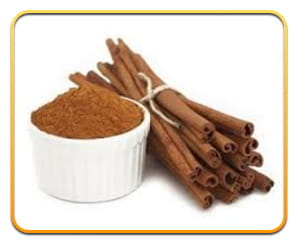

 3. Cayenne - This hot spice not only heats up your dishes, it heats up your body and
3. Cayenne - This hot spice not only heats up your dishes, it heats up your body and  9. Oregano
- This herb contains an oil that is a very potent anti-bacterial,
anti-fungal and anti-viral agent, rosmarinic acid (also found in
rosemary). Oregano oil has been used to treat a wide range of
conditions from bacterial and viral infections, to parasites and
stubborn fungal infections. Although the oil of oregano is most often
used for medicinal purposes, the herb itself can provide many of the
same benefits when consumed regularly.
9. Oregano
- This herb contains an oil that is a very potent anti-bacterial,
anti-fungal and anti-viral agent, rosmarinic acid (also found in
rosemary). Oregano oil has been used to treat a wide range of
conditions from bacterial and viral infections, to parasites and
stubborn fungal infections. Although the oil of oregano is most often
used for medicinal purposes, the herb itself can provide many of the
same benefits when consumed regularly.




